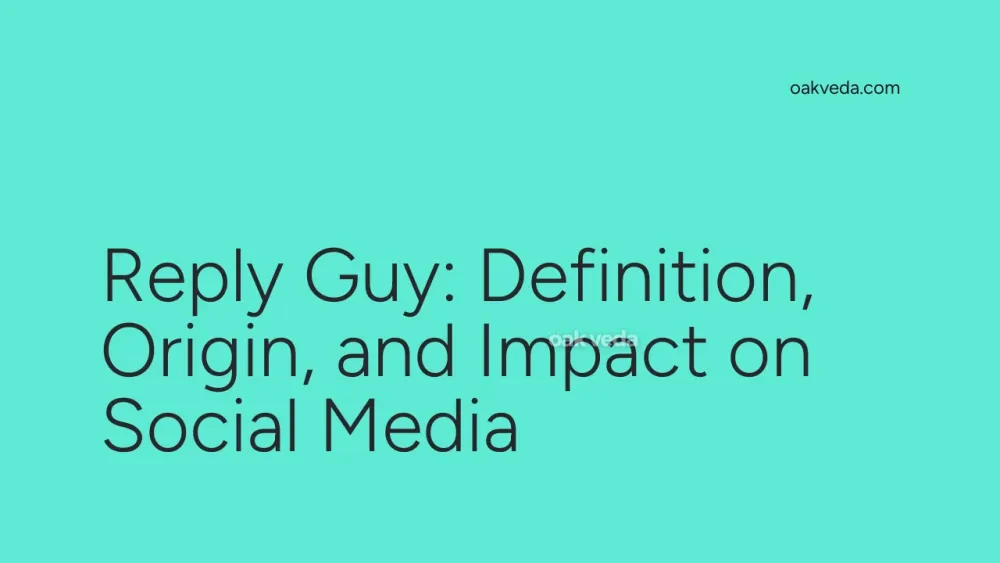
What is a Reply Guy?
A reply guy is a social media user who consistently and excessively responds to posts, particularly those from users with larger followings. These individuals are characterized by their persistent, often unsolicited, and sometimes inappropriate comments on various social media platforms. Reply guys typically seek attention, validation, or engagement from the original poster, often to the point of becoming a nuisance.
Origin and Development of the Reply Guy Phenomenon
The term "reply guy" emerged in the mid-2010s as social media platforms gained popularity and users began noticing patterns in online behavior. While the exact origin is unclear, the phrase gained traction on Twitter, where the platform's structure makes it easy for users to repeatedly engage with others' content.
As social media evolved, so did the understanding of different user archetypes. The reply guy became a recognized phenomenon, often discussed and memed about within online communities.
How Reply Guys Operate
Reply guys typically exhibit the following behaviors:
- Frequent responses to posts, especially from popular accounts
- Comments that add little value to the conversation
- Attempts to prolong interactions unnecessarily
- Excessive use of tagging or mentioning the original poster
- Disregard for social cues or requests to disengage
These actions often stem from a desire for attention, a misunderstanding of social norms, or an inflated sense of the value of their contributions.
Types of Reply Guys
While the term "reply guy" is broad, several subtypes have been identified:
- The Mansplainer: Offers unsolicited explanations, often to women, about topics they're already knowledgeable about.
- The Devil's Advocate: Constantly argues contrarian viewpoints, even on uncontroversial topics.
- The Compliment Fisher: Leaves excessively flattering comments in hopes of receiving attention or reciprocation.
- The Fact Checker: Nitpicks minor details or attempts to correct perceived inaccuracies in posts.
- The White Knight: Rushes to defend users (often women) from perceived slights, even when unwarranted.
Popular Examples of Reply Guy Behavior
While it's not appropriate to name specific individuals, reply guy behavior is prevalent across various social media platforms. Celebrities, politicians, and influencers often attract reply guys who consistently engage with their posts, regardless of content or context.
One notable example is the phenomenon of users replying "first" to new posts, a behavior that adds no value but seeks attention through rapid engagement.
Impact of Reply Guys on Social Media Culture
The rise of reply guys has significantly influenced online interactions:
- Increased awareness: Users have become more conscious of their own commenting behaviors.
- Development of coping strategies: Many users have adopted techniques to manage unwanted interactions, such as muting or blocking.
- Changes in platform features: Some social media platforms have introduced tools to limit replies or filter comments in response to this phenomenon.
- Shifts in online etiquette: There's a growing emphasis on thoughtful engagement rather than constant interaction.
Controversies Surrounding Reply Guys
The reply guy phenomenon has sparked debates about online behavior, gender dynamics, and digital etiquette. Some argue that labeling someone a "reply guy" can be unfairly stigmatizing, while others contend it's a necessary term to describe a real problem in online spaces.
There's also ongoing discussion about the gendered nature of the term, as reply guys are often, but not always, men interacting with women online.
How Brands and Influencers Handle Reply Guys
Brands and influencers have developed strategies to manage reply guys:
- Selective engagement: Choosing to interact only with constructive comments.
- Clear boundaries: Establishing and communicating guidelines for follower interactions.
- Moderation tools: Utilizing platform features to filter or limit comments.
- Community management: Employing teams to handle excessive or inappropriate engagement.
- Humor and deflection: Some use wit or self-deprecation to address reply guys indirectly.
Future Trends Related to Reply Guys
As social media continues to evolve, we can expect:
- Advanced AI moderation: Improved tools to automatically identify and manage reply guy behavior.
- Increased user control: More granular options for users to curate their online experiences.
- Evolving social norms: Continued refinement of what constitutes appropriate online interaction.
- Education initiatives: Efforts to teach digital etiquette and responsible online behavior.
FAQs about Reply Guys
-
Is being a reply guy always negative? Not necessarily. The term is generally used negatively, but some forms of consistent engagement can be positive if they add value and respect boundaries.
-
How can I avoid being labeled a reply guy? Be mindful of your engagement frequency, ensure your comments add value, and respect others' space and boundaries online.
-
Are there female reply guys? Yes, while the term often refers to male behavior, people of any gender can exhibit reply guy characteristics.
-
How should I deal with a reply guy? Use platform tools like muting or blocking, set clear boundaries, and don't feel obligated to engage with every comment.
-
Can reply guy behavior be considered harassment? In extreme cases, persistent unwanted interactions from reply guys can cross into harassment. Most platforms have reporting mechanisms for such situations.
Understanding the reply guy phenomenon helps navigate social media more effectively, fostering healthier online interactions and communities. By recognizing these behaviors, users can better manage their digital experiences and contribute to a more positive online environment.
You may be interested in:
- Camp in Social Media: Definition, Origin, and Impact
- Bestie: Definition, Origin, and Impact on Social Media
- SEO: Definition, Origin, and Impact on Digital Marketing
- Spamming on Social Media: Definition, Origin, and Impact
- Glow-Down: Definition, Origin, and Impact on Social Media
- Macro-Influencer: Definition, Origin, and Impact

